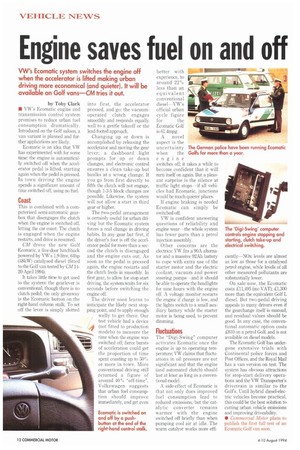Engine saves fuel on and off
Page 14

If you've noticed an error in this article please click here to report it so we can fix it.
VW's Ecomatic system switches the engine off when the accelerator is lifted making urban driving more economical (and quieter). It will be available on Golf vans—CM tries it out.
by Toby Clark • VW's Ecomatic engine and transmission control system promises to reduce urban fuel consumption dramatically. Introduced on the Golf saloon, a van variant is planned and further applications are likely.
Ecomatic is an idea that VW has experimented with for some time: the engine is automatically switched off when the accelerator pedal is lifted, starting again when the pedal is pressed. In town driving the engine spends a significant amount of time switched off, using no fuel.
Coast
This is combined with a computerised semi-automatic gearbox that that disengages the clutch when the engine is switched off, letting the car coast. The clutch is engaged when the engine restarts, and drive is resumed.
CM drove the new Golf Ecomatic, a five-door hatchback powered by VW's 1.9-litre, 64hp (48kW) catalysed diesel (fitted to the Golf van tested by CM 1420 April 1994).
It takes little time to get used to the system: the gearlever is conventional, though there is no clutch pedal; the only giveaway is the Ecomatic button on the right-hand column stalk. To set off the lever is simply slotted into first, the accelerator pressed, and go: the vacuumoperated clutch engages smoothly and responds equally well to a gentle takeoff or the lead-footed approach.
Changing up or down is accomplished by releasing the accelerator and moving the gear lever; a dashboard light prompts for up or down changes, and electronic control ensures a clean take-up but baulks at a wrong change. If you go from first directly to fifth the clutch will not engage, though 1-3-5 block changes are possible. Likewise, the system will not allow a start in third gear or higher.
The two-pedal arrangement is certainly useful for urban driving but the Ecomatic system forces a real change in driving habits. In any gear but first, if the driver's foot is off the accelerator pedal for more than a second the clutch is disengaged and the engine cuts out, As soon as the pedal is pressed again, the engine restarts and the clutch feeds in smoothly. In first gear, to allow for stop-start driving, the system waits for six seconds before switching the engine off.
The driver soon learns to anticipate the likely next stopping point, and to apply enough welly to get there. Our test vehicle had a device (not fitted to production models) to measure the time when the engine was switched off; fierce bursts of acceleration could get the proportion of time spent coasting up to 50"',, or more in town. More conventional driving still returned a figure of around 40% "off-time". Volkswagen suggests that urban fuel consumption should improve immediately, and get even better with experience, to around 22% less than an equivalent conventional d iesel —ViAr's official urban cycle figure for the Ecomatic Golf is 61Ampg.
A novel aspect is the uncertainty when the engine switches off; it takes a while to become confident that it will turn itself on again. But a pleasant surprise is the silence at
traffic light stops if all vehicles had Ecomatic, junctions would be much quieter places.
If engine braking is needed Ecomatic can simply be switched off.
VW is confident answering questions of reliability and engine wear—the whole system has fewer parts than a petrol injection assembly.
Other concerns are the electrics: VW fits a 90A alternator and a massive 92Ah battery to cope with extra use of the starter motor and the electric coolant, vacuum and power steering pumps—and it should be able to operate the headlights for nine hours with the engine off. A voltage monitor restarts the engine if charge is low, and the lights switch to a small auxiliary battery while the starter motor is being used, to prevent dimming.
Fluctuations
The "Digi-Swing" computer activates Ecomatic once the engine is up to operating temperature; VW claims that fluctuations in oil pressure are not significant and that the engine (and automated clutch) should last at least as long as a conventional model.
A side-effect of Ecomatic is that not only does improved fuel consumption lead to reduced emissions, but the catalytic converter remains warmer with the engine switched off briefly than when pumping cool air at idle. The warm catalyst works more effi ciently—NOx levels are almost as tow as those for a catalysed petrol engine, while levels of all other measured pollutants are substantially lower.
On sale now, the Ecomatic costs L'1L495 (inc-VAT); £1,300 more than the equivalent Golf L diesel. But two-pedal driving appeals to many drivers even if the gearchange itself is manual, and residual values should be good. In any case, the conventional automatic option costs £810 on a petrol Golf, and is not available on diesel models.
The Ecomatic Golf has undergone extensive trials with Continental police forces and Post Offices, and the Royal Mail has a van version on test. The system has obvious attractions for stop-start delivery operations and the VW Transporter's drivetrain is similar to the Golf's. Until hybrid diesel-electric vehicles become practical, this could be the best solution to cutting urban vehicle emissions and improving driveability.
• Commercial Motor plans to publish the first full test of an Ecomatic Golf van soon.






















































































